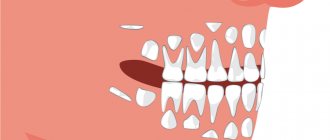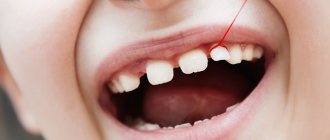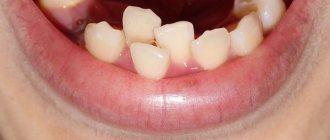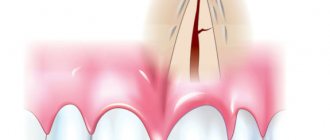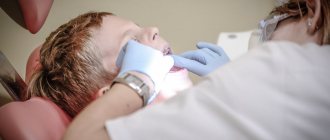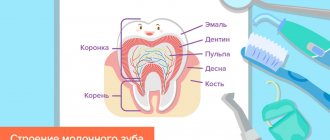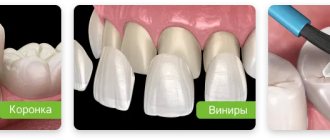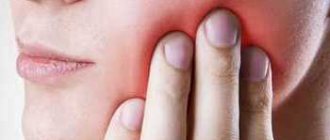We often hear from parents that it is not necessary to treat baby teeth. After all, they will fall out by themselves. But this popular belief is wrong. Baby teeth, of course, will fall out in due time, but their diseases can bring a lot of suffering to children, as well as damage the health of future permanent teeth - even to the point of malocclusion. Let's figure out whether baby teeth need to be treated, in what cases and how to do it.
Treat or remove baby teeth
Before talking about how baby teeth are treated, it is necessary to note their features that distinguish them from permanent teeth. First of all, baby teeth have thinner enamel, making them very vulnerable to tooth decay and other damage. In addition, contrary to popular belief, baby teeth also have roots, although they are smaller and thinner than the roots of permanent teeth.
In this regard, the question arises: are milk teeth treated in children, or can they be removed if problems arise - after all, after some time, permanent teeth will appear in their place. It is important to understand here that most often a very short period of time passes between the spontaneous loss of a baby tooth and the appearance of a permanent one. In fact, the baby tooth falls out at the moment when the permanent tooth is ready to develop. But if a baby tooth is removed before its due date, an empty socket will appear on the child’s jaw, which may remain without a tooth for many weeks and even months. In this situation, neighboring teeth will begin to shift towards the socket, which will increase the gaps between them and create obstacles for the growth of a permanent tooth. It may begin to hurt, it will grow crooked, the formation of the bite will not occur correctly - and the child, in order to avoid serious problems and return a beautiful smile, will have to endure many dental procedures and even, probably, wear braces. Therefore, modern dentists are trying their best to preserve baby teeth until they naturally fall out - using different methods, including installing crowns.
In addition, when thinking about why we should treat baby teeth, we should not forget about the main function of teeth - chewing. If we simply remove a child’s diseased baby teeth, what will he chew on? In this case, the child will have to get a prosthesis, since it may take a long time for permanent teeth to emerge in place of the removed milk teeth.
Correcting your bite with braces is harmful because the teeth underneath them begin to deteriorate.
This is an incorrect statement. After all, braces are small clasps that are attached to the teeth using a special photopolymer composite orthodontic material that contains fluoride and is completely harmless to tooth enamel. Carious lesions in patients who wear braces can only occur due to poor oral hygiene. If they eat foods that are prohibited by the orthodontist, do not brush their teeth and the system itself after eating food or do not do so at all, and do not use rinses and special orthodontic brushes for teeth, then they are immediately automatically placed at risk of developing caries.
Is it necessary to treat caries of baby teeth?
Due to their thin enamel, baby teeth are very susceptible to tooth decay. At the earliest stage, caries does not even require drilling and filling - you can get by with polishing the tooth and applying a special mineralizing paste. But if the moment is missed and a hole has formed, then the treatment will be more serious. But in any case, parents who doubt whether it is worth treating caries of baby teeth should remember that on delicate baby teeth with thin enamel, caries develops much more rapidly than in adults. Therefore, severe toothache can suddenly overtake a child in the most inopportune situation - at the grandmother’s dacha, on a trip abroad. You will have to urgently look for a suitable clinic, possibly spend a lot of money and risk the child’s health, because if the tooth is removed poorly, parts of the roots may remain in the socket, which will interfere with the eruption of the permanent tooth.
Caries of baby teeth in children is also treated because it can become a source of infection, lead to periodontitis, and damage nearby permanent teeth. As in adults, caries in children must be treated promptly and as early as possible in order to preserve the tooth and not damage the normal development of the child’s jaw and bite.
Are all sweets bad for your teeth?
Very often, parents are of the opinion that dried fruits and honey are not sugar, so they cannot harm the teeth, especially if the package says “Organic”. But this is a mistaken opinion. Healthy sweets also contain adhesive sugars that can cause tooth decay. This also applies to various sweet drinks - compotes, fruit drinks, juices, as well as children's cookies and sweet buns. Dentists do not prohibit eating sweets, but urge you to choose the least harmful ones - marshmallows, marshmallows, cocoa, chocolate containing a lot of cocoa. By the way, these experts believe that it is better to eat several candies at once than one every hour.
But if, despite all your efforts, your baby’s teeth are still constantly deteriorating, this may be a signal that a thorough examination of the body is necessary. Bad teeth can occur if something is wrong with the child’s health.
Is it necessary to treat pulpitis on baby teeth?
Pulpitis is inflammation of the pulp, i.e. nerve and surrounding soft tissues. Sometimes for some reason they believe that pulpitis does not occur in children. But baby teeth also contain nerves and they can become inflamed in the same way. The reasons are:
- advanced caries,
- tooth injury,
- an error in the treatment of caries (the dentin of a baby tooth is very thin and a dentist who does not have much experience in treating baby teeth in children may accidentally open the pulp chamber),
- infectious disease (for example, severe sore throat, as a result of which the infection penetrates the tooth from the inside, through the blood).
Pulpitis in children is uncommon, but does occur. Therefore, it is necessary to treat it. Otherwise, it can become chronic and not only lead to tooth loss too early, but can also transmit inflammation to the new emerging permanent tooth.
Pulpitis in baby teeth is now treated in three ways:
- Classical devital amputation: the diseased nerve is killed with a special paste, after a few days the pulp is removed and the tooth is filled. Now this method is considered outdated, but nevertheless is sometimes used.
- Vital amputation: if only part of the nerve is inflamed, then at the very beginning of the inflammation it is possible to remove the affected part of the nerve under anesthesia, and an antiseptic anti-inflammatory agent is applied to the rest and the tooth is filled. The operation is complex and leaves the possibility of re-inflammation of the pulp.
- Vital pulp extraction: under strong anesthesia, the inflamed pulp is completely removed and the pulp chamber is filled with a special zinc-eugenol paste, which in the future will be absorbed along with the roots of the baby tooth. The method is effective, but expensive and requires a highly qualified dentist.
Much more often, doctors suggest simply removing a baby tooth affected by pulpitis. This is both simpler and cheaper, but, unfortunately, there is a possibility of displacement of adjacent teeth (if the permanent tooth does not erupt soon), which can lead to the formation of a malocclusion. To avoid such a situation, it is best not to let the situation develop into pulpitis, but to treat caries as early as possible.
The most common dental diseases in childhood
Among the main problems that force children to undergo dental treatment:
- Caries. Children encounter it most often. The disease is found in more than 60% of children under six years of age. It especially often affects molars. This is due to their relief volumetric surface and the baby’s nutritional conditions. On the crown of molars, plaque is deposited more actively. Pathogenic microorganisms multiply in it. The result of their life activity is progressive caries. The difficulty is that in the first stages, parents are not always able to detect a carious cavity on their own. It looks like a light speck and practically merges with the healthy surrounding enamel. Not knowing about the presence of the disease, mothers and fathers postpone a visit to the pediatric dentist. When the child arrives for an appointment, the carious “hollow” already turns out to be very large.
- Periostitis (flux). A complication of advanced caries, caused by the spread of bacteria, damage to tooth roots and tissues adjacent to them. The cheek is swollen. A voluminous abscess forms on the surface of the gum. When palpated, acute pain occurs. Flux may worsen the baby's general condition.
- Periodontitis. Inflammatory periodontal disease. The latter is formed by: periodontal ligament, gums, root cement and alveolar bone. It hurts your baby to bite into hard food. His temperature rises and headaches appear.
All of these dental diseases are highly treatable. The most important thing is not to put off visiting a dental clinic until later.
Is it worth treating baby teeth under anesthesia (sedation)
Despite the fact that many parents consider baby teeth to be fake (or, on the contrary, by nature more protected) and underestimate the problems that arise with them, it is still painful to treat baby teeth - just like molars. Therefore, it is important to contact pediatric dentistry, since the requirements for anesthetics for children are more stringent, and the necessary drugs may not be available in a regular “adult” clinic.
In many cases, treating baby teeth under anesthesia is not only possible, but also necessary. A distinction must be made between anesthesia and sedation. Sedation is the process of calming a small patient, relieving excessive agitation or fear before dental procedures. It is achieved with mild, safe means (for example, nitrous oxide) and is not accompanied by pain relief.
Anesthesia involves the patient falling asleep and dental treatment in his sleep. For children, the use of two drugs is allowed: sevoran, administered through a special mask, and propofol, administered intravenously. These are safe, well-tested products that are highly effective and do not affect the child’s nervous system.
Anesthesia is used in cases where it is difficult for the doctor to establish contact with the child, or there is a pathological fear of dental procedures. And also when a voluminous or complex intervention is expected: removal of several teeth, treatment of deep caries or pulpitis, etc. It is very difficult for a preschool child (or primary school student) to sit motionless in a chair for more than 20-30 minutes, and anesthesia will allow him to receive the necessary treatment in full, completely unnoticeably and painlessly.
The child can brush his teeth independently
Any child must brush his teeth on his own, and then his parents must finish what he cannot yet do on his own. Gradually, children begin to perform all movements correctly. In no case should adults rush this process so that it is not difficult for the little one. After all, this way they can instill a dislike for the procedure of brushing their teeth. Dentists advise parents to actively participate in brushing their teeth up to the age of seven, and for children over 7 years old to also do this, but only passively. It is even sometimes advisable to supervise teenagers while brushing their teeth.
At what age should children have their baby teeth treated?
It is necessary to treat baby teeth at any age. In the first years, when baby teeth erupt, children are often limited in sweets and caries develops infrequently. At the age of 3-5 years, the situation becomes more complicated due to the fact that sweets become more accessible, and teeth brushing is often carried out irregularly and without due diligence.
At about 5-6 years old, baby teeth begin to be replaced by permanent ones. Usually this process is completed by the age of 14, although deviations in one direction or another are often encountered. It makes no sense for parents to wait for a certain time to start seriously taking care of their child’s teeth and taking him to the dentist. As we have already said, diseases of baby teeth can lead to their untimely loss and even cause damage to future permanent teeth. Decayed and prematurely lost baby teeth can cause problems with diction, prevent a child from chewing food normally, and cause digestive problems.
Therefore, from the very beginning, it is important to accustom children to regular oral hygiene, limit their insatiable love for sweets, and periodically take them for preventative visits to the dentist. In order for children not to be afraid of the dentist, it is important to choose a good clinic that employs pediatric dentists, with experience in treating primary teeth and attentive attitude towards young patients. If a child knows that a visit to the dentist does not necessarily mean that their teeth will be drilled, then they will be able to accept these regular visits with greater peace of mind, and their smile will always be flawless.
Prevention is the best solution
So that you do not have to worry about treating or removing baby teeth, organize proper nutrition for your child and oral care.
Try to prevent your baby from consuming a lot of sweets; if possible, reduce the amount of sweet juices and carbonated drinks in the diet. And, of course, take care of regular and proper brushing of your teeth.
The child should brush his teeth 2 times a day: morning and evening. At the same time, do not allow any snacks after brushing your teeth in the evening. If your child is under two years old, brush his teeth yourself. At this age, by the way, be sure to use special toothpastes recommended for children over 0 years old, for example, ASEPTA baby.
Older children should brush their teeth themselves, but always under adult supervision. From the age of two, also visit the dentist at least 2 times a year. This is the only way you can prevent the development of serious dental diseases and ensure timely resolution of all emerging problems.

